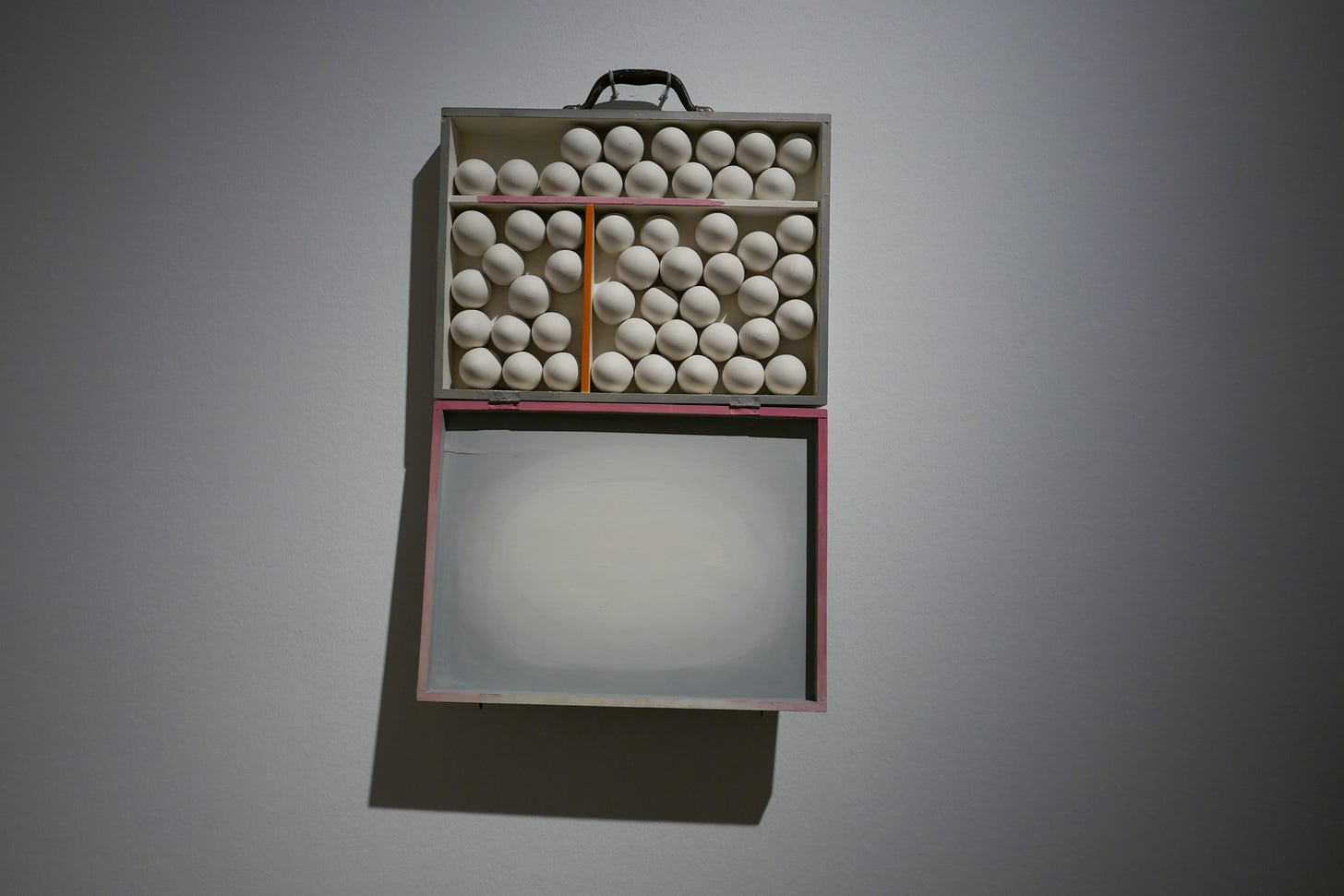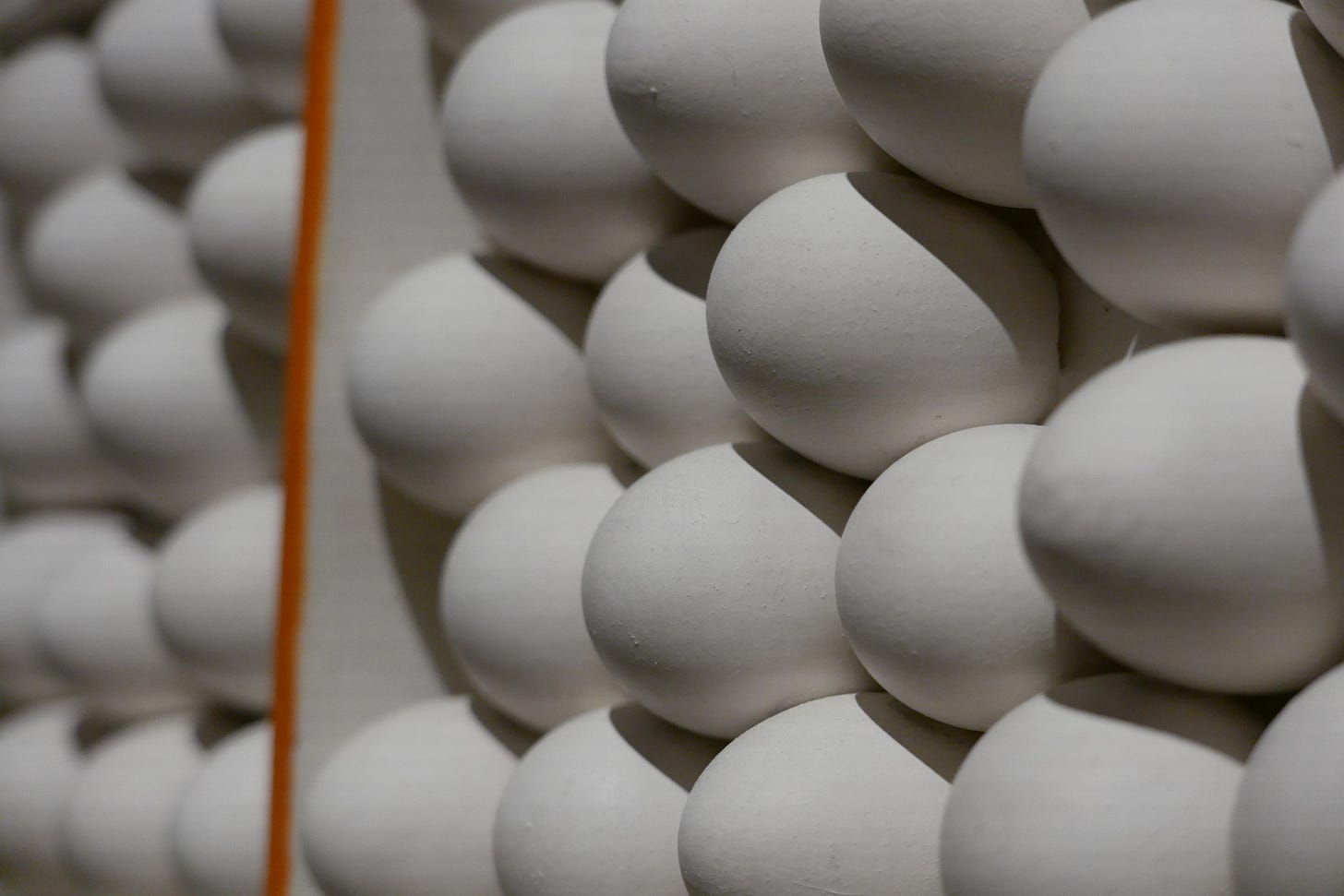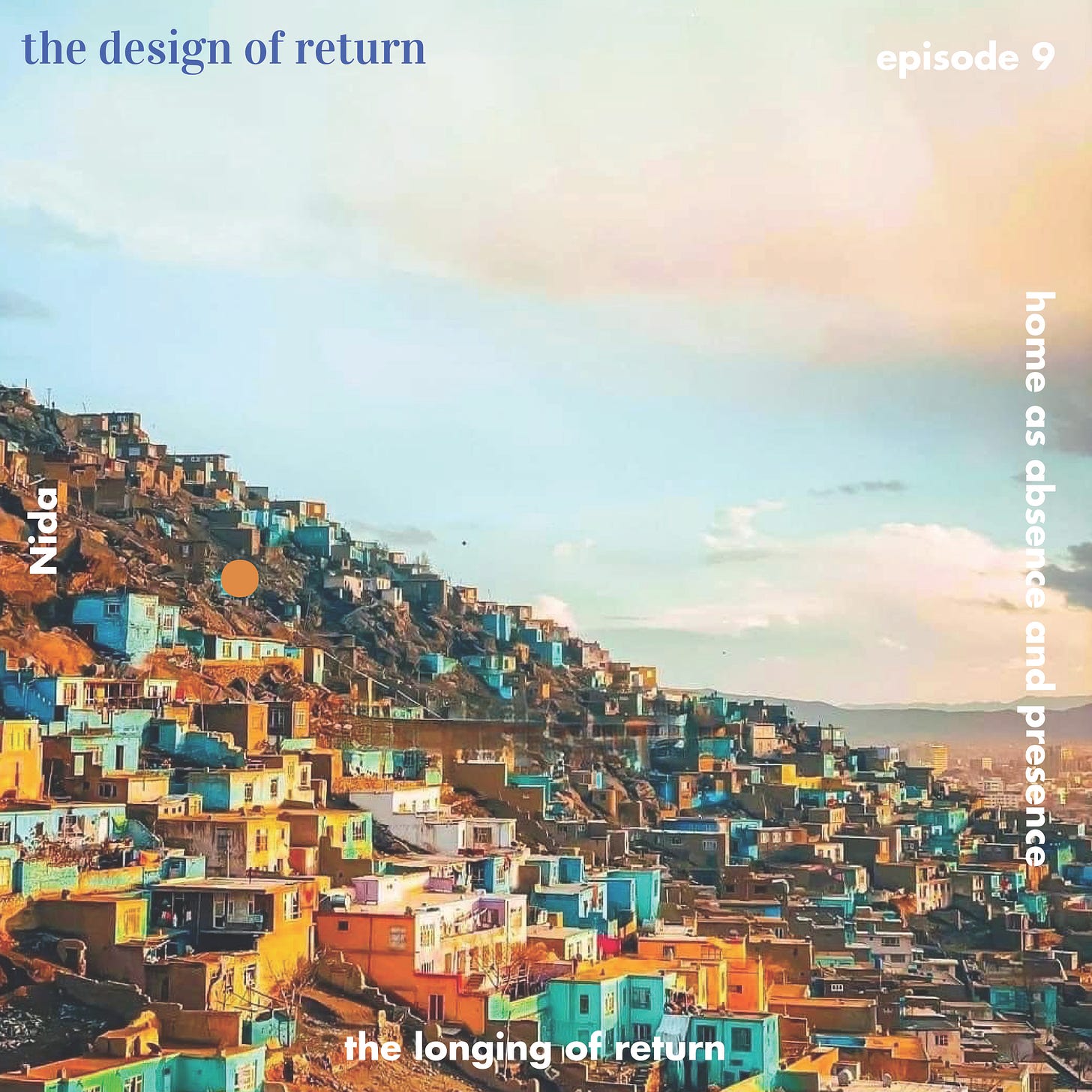Thank you for being here! This is the ninth edition of the Atlas newsletter. Here you can find “The Design of Return podcast - episode 9” , the story of Nida and her longing to return to her homeland in Afghanistan while rebuilding a sense of home in Germany where she sought asylum with her family; show notes and additional resources on the theme for #thelibraryoftransit below. This is the last podcast episode for now, the exploration of the inner and outer places of the in-between continues in the newsletter.
Eggshells
At the end of last year, I visited the Ludwig Museum of contemporary art in Budapest.
One floor of the exhibition featured works curated to be “time machines” to travel individual destinies and family stories through social changes and fallen utopias.
On one wall of the exhibit, next to a couple of old family photos framed under glass, it was a 1970 piece by Hungarian painter and professor Ilona Keserü.
It was a wooden luggage, hanged open on the wall. Inside of it, there were no photos, or no clothes, but a bunch of neatly arranged eggshells.
My heart gulped at the sight of this.
Nothing more than impossibly neat rows of eggshells in a luggage spoke to me about how we experience the idea of home in constant displacement.
It is something fragile, almost impossible to rebuild in its original shape once the initial tie has been broken, something that is rebuilt by becoming a portable series of collectible ideas that are as personal and irreplaceable as the content of a luggage.
Welcome back to our last episode of this season of the Design of Return podcast.
In our excursions into the world and lives of who we call the “in-betweeners” in the past year we understood there are many forces that drive us to leave home with a luggage full of eggshells.
To see if there is a world out there in which if you are many things but cannot possibly fit only into one, you are understood. To see if you can build something you can recognize yourself in because the world out there is not building it for you.
Along the way, I realized there is a fundamental difference in living the “in-between” life as a consequence of the pull of possibilities rather than as a consequence of the pull of survival.
Today’s story is a story of finding your way home when home has been taken away.
I speak to Nida, but that is not her real name. She is an Afghan woman who was forced to flee her land with her husband following the Taliban return to power in Afghanistan and seek asylum in Germany.
Our encounter began from afar, in a theatre in Turin at the beginning of the year.
I was there giving a speech on empathy in transition at the Non-Profit Women Camp conference once a fellow speaker got up on stage with an invitation.
She invited all the women and professionals in the room to not forget about the situation of women in Afghanistan, now the Ukraine crisis was in full force.
The woman was Silvia Redigolo. She is the head of communication and an activist of Pangea Onlus, a foundation which has been operating in Kabul since 2003.
Pangea works at empowering Afghan women to become part of the world again and come out of a daily life of violence and discrimination to rebuild a new life. They do that through financial programs of micro-loaning, work and healthcare education programs and active and holistic support.
When we offered to help with our platform, she introduced me to Nida with whom we had many conversations ever since until one of them became this podcast.
The Design of Return Episode # 9 “The longing of return” - Show Notes
Our episode 9 is the story of Nida and her longing to return to her homeland in Afghanistan while rebuilding a sense of home somewhere else.
Poet Adrienne Rich wrote « It is always what is under pressure in us that explodes into poetry ».
When home has been taken away, longing is like that pressure that lurks in the darkness until art can give it a place in the world, even though this place is never fully rooted but rather oscillates in between home’s absence and presence.
Nida took asylum in Germany with her family after having to flee her land. Even though her physical presence was no longer something she could offer, she never stopped working with and for women in Afghanistan though her work with Pangea Onlus, a foundation which has been operating in Kabul since 2003 working at empowering Afghan women to become part of the world again by coming out of a daily life of violence and discrimination.
In our conversation we explore both the tenderness and the pain of Nida’s relationship with her homeland; how her work with Pangea Onlus shaped her purpose and about what it means to dwell with longing and rebuild a sense of home through poetry.
4:56 The meaning of home in Farsi
6:38 Nida’s childhood in Kabul
11:41Afghanistan’s land as a leaf
14:58 Migrating to Pakistan
17:45 The inner home
20:21 Home as a place of safety
21:44 Nida’s return to Afghanistan
24:00 Discovering her purpose with Pangea Onlus
29:27 Fighting the erasing of women in Afghan society
32:15 The change she witnessed
34:55 Seeking asylum in Germany
35:58 The impossibility of staying as a woman on her own
38:17 The memory of her last day in Kabul
40:10 Poetry as an experience of encounter
40:26 Nida reading us her poem “I will never forget”
44:42 Her cultural journey in Germany today
49:25 Nida’s life as an Afghan-German
50:55 Her biggest source of hope today
52:50 Gathering around Nida’s “tablecloth of hope”
#thelibraryoftransit. Read, watch, learn.
Matthieu Aikins “The naked don’t fear the water” is the story of an underground journey with Afghan refugees in which an acclaimed war reporter chronicles a dangerous journey on the smuggler’s road to Europe, accompanying his friend, an Afghan refugee in search of a better future
Janne Teller “Immagina di essere in guerra” is a book in the shape of a red passport. It’s about fear. Fleeing. Survival. Exile. And the longing of a return home. But home, where? In an incredible empathy experiment, she leads us into living the experience of war on our skin.
Read about Afghan women artful resistance and planting a seed to paint for freedom
If you read this newsletter and value it, consider going to the paid version.
If you’re reading this in your inbox, you can find a shareable version online here. Or share with a friend here.
You can follow us on Instagram here. You can follow me on instagram here. Feel free to comment below — and you can always reach me at thedesignofreturn@gmail.com.





